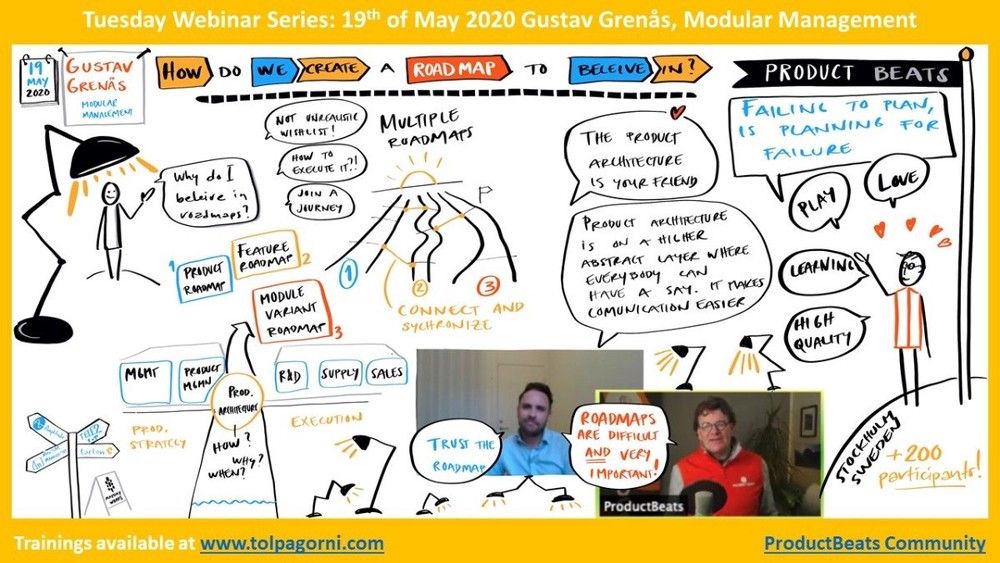Episode 9: Product Roadmapping Secrets w/Gustav Grenås
19 May, 2020 / Host: Magnus Billgren
How to Create a Product Roadmap Your Stakeholders Will Believe In
As a Product Manager, one of the most important tools in your arsenal is the product roadmap. It's a document that outlines your product's vision and goals, and serves as a guide for your team to execute on that vision. However, creating a roadmap that all stakeholders can believe in can be a challenge. In this episode of Productbeats, we'll explore how to create a roadmap that meets the needs of all stakeholders and tips from Gustav Grenås on product roadmapping secrets.
Importance of Roadmaps
Roadmaps are a critical tool for product managers, as they help to align stakeholders, prioritize work, and communicate product plans. However, when you create a roadmap, all your stakeholders will look at it from different perspectives. Sales will want to see their customers' demands, management will want to know why more isn't being done for the money invested, development will be concerned about technical debt, and marketing will want to know what features they can market.
The Importance of Scoping
To create a roadmap that all stakeholders can believe in, it's important to consider three essential aspects: underlying product strategy, the process for creating and updating the roadmap, and scoping. Scoping is especially critical as it determines what the roadmap will describe. Will it cover the entire portfolio, platform, features, services, or just one product?
Product Architecture
Gustav Grenås shared his thoughts on the roadmap and emphasized the importance of the product architecture. According to Grenås, defining your product architecture makes it easier to create a roadmap that everyone can believe in. The product architecture provides structure for the roadmap and also defines the formula for long-term profits. As Grenås states, the product architecture is a great friend when doing the product job.
Creating a Roadmap to Believe In
To create a roadmap that all stakeholders can believe in, it's essential to follow these tips:
- Focus on the product architecture: Define your product architecture to provide structure for the roadmap.
- Listen to your stakeholders: Listen to your stakeholders' concerns and incorporate them into the roadmap as appropriate.
- Don't cave to stakeholder pressure: Stick to your product strategy and don't change the roadmap too quickly in response to stakeholder pressure.
- Communicate clearly: Make sure that everyone understands the roadmap and what it means for the product's future.
- Use the right tools: Choose the right tools for creating and updating the roadmap, such as Gantt charts or other project management software.
Takeaways
- A roadmap should be based on a solid underlying product strategy, which is not the roadmap itself but rather the result of it. The product architecture can be a useful tool for creating a roadmap that stakeholders can believe in.
- The process for creating and updating the roadmap, including the tools used, is also critical to its success. Product managers should ensure that they have a transparent and collaborative process in place that incorporates stakeholder input.
- When scoping the roadmap, it's essential to consider what the roadmap is describing: portfolio, platform, features, services, or just one product. Understanding the scope of the roadmap will help product managers to create a roadmap that meets stakeholders' needs and can be effectively executed.
If you want to become a skilled product manager, consider enrolling in the Productbeats Product Management Certification Program. The program covers all aspects of product management, from product strategy to roadmapping to product development and beyond. It's an excellent way to gain the skills and knowledge you need to create roadmaps that all stakeholders can believe in.
You might also enjoy watching...
Copyright © 2026 ProductBeats AB

Get The Program Brochure
Submit the form below to have The Program Brochure delivered to your inbox
The title of the notification
The descriptive text of the notification


